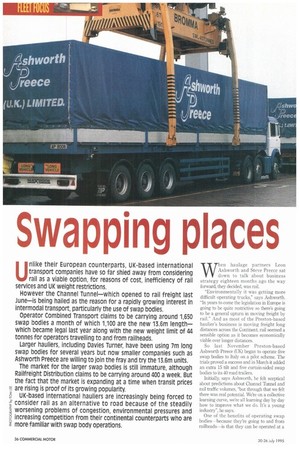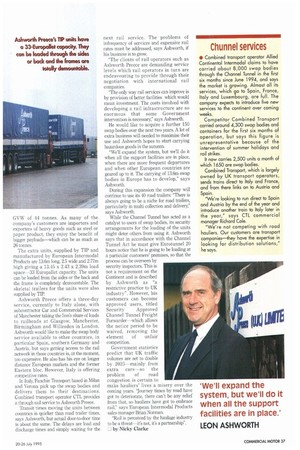Swapping places
Page 38

Page 39

If you've noticed an error in this article please click here to report it so we can fix it.
Unlike their European counterparts, UK-based international transport companies have so far shied away from considering rail as a viable option, for reasons of cost, inefficiency of rail services and UK weight restrictions.
However the Channel Tunnel—which opened to rail freight last June—is being hailed as the reason for a rapidly growing interest in intermodal transport, particularly the use of swap bodies.
Operator Combined Transport claims to be carrying around 1,650 swap bodies a month of which 1,100 are the new 13.6m length— which became legal last year along with the new weight limit of 44 tonnes for operators travelling to and from railheads.
Larger hauliers, including Davies Turner, have been using 7m long swap bodies for several years but now smaller companies such as Ashworth Preece are willing to join the fray and try the 13.6m units.
The market for the larger swap bodies is still immature, although Railfreight Distribution claims to be carrying around 400 a week. But the fact that the market is expanding at a time when transit prices t are rising is proof of its growing popularity. 1 ,(2 UK-based international hauliers are increasingly being forced to -! consider rail as an alternative to road because of the steadily worsening problems of congestion, environmental pressures and increasing competition from their continental counterparts who are 0 1 more familiar with swap body operations.
When haulage partners Leon Ashworth and Steve Preece sat down to talk about business strategy eighteen months ago the way forward, they decided, was rail.
"Environmentally it was getting more difficult operating trucks," says Ashworth. "In years to come the legislation in Europe is going to be quite restrictive so there's going to be a general upturn in moving freight by rail." And as most of the Preston-based haulier's business is moving freight long distances across the Continent, rail seemed a sensible option as it becomes economically viable over longer distances.
So last November Preston-based Ashworth Preece (UK) began to operate five swap bodies to Italy on a pilot scheme. The trials proved a success and in March it added an extra 15 tilt and five curtain-sided swap bodies to its 40 road trailers.
Initially, says Ashworth, he felt sceptical about predictions about Channel Tunnel and rail traffic volumes, "but through that we felt there was real potential. We're on a collective learning curve, we're all learning day by day how to improve what we do. It's a young industry", he says.
One of the benefits of operating swap bodies-because they're going to and from railheads—is that they can be operated at a G'VW of 44 tonnes. As many of the company's customers are importers and exporters of heavy goods such as steel or paper product, they enjoy the benefit of bigger payloads—which can be as much as 26 tonnes.
The extra units, supplied by TIP and manufactured by European Intermodal Products are 13.6m long, 2.5 wide and 2.77m high giving a 13.45 x 2.43 x 2.39m load space-33 Europallet capacity. The units can be loaded from the sides or the back and the frame is completely demountable. The skeletal trailers for the units were also supplied by TIP Ashworth Preece offers a three-day service, currently to Italy alone, with subcontractor Car and Commercial Services of Manchester taking the lion's share of loads to railheads at Glasgow, Manchester, Birmingham and Willesden in London. Ashworth would like to make the swap body service available to other countries, in particular Spain, southern Germany and Austria, but says getting access to the rail network in those countries is, at the moment, too expensive. He also has his eye on longer distance European markets and the former Eastern bloc. However, Italy is offering competitive rates.
In Italy, Fanchin Transport based in Milan and Verona pick up the swap bodies and delivers them to their destinations. Combined transport operator cm provides a through rail service to Ashworth Preece.
Transit times moving the units between countries is quicker than road trailer times, says Ashworth, but actual door-to-door time is about the same. The delays are load and discharge times and simply waiting for the next rail service. The problems of I infrequency of services and expensive rail rates must be addressed, says Ashworth, if his business is to grow.
"The clients of rail operators such as Ashworth Preece are demanding service levels which rail operators in turn are endeavouring to provide through their negotiation with international rail companies.
"The only way rail services can improve is by provision of better facilities which would mean investment. The costs involved with developing a rail infrastructure are so enormous that some Government intervention is necessary;" says Ashworth.
He would like to acquire a further 150 swap bodies over the next two years. A lot of extra business will needed to maximise their use and Ashworth hopes to start carrying hazardous goods in the autumn.
"We'll expand the system, but we'll do it when all the support facilities are in place, when there are more frequent departures and when other European countries are geared up to it. The carrying of 13.6m swap bodies in Europe has to develop," says Ashworth.
During this expansion the company will continue to use its 40 road trailers: "There is always going to be a niche for road trailers, particularly in multi collection and delivery," says Ashworth.
While the Channel Tunnel has acted as a catalyst to users of swap bodies, its security arrangements for the loading of the units might deter others from using it. Ashworth says that in accordance with the Channel Tunnel Act he must give Eurotunnel 20 hours notice that he is going to be loading at a particular customers' premises, so that the process can be overseen by security inspectors. This is not a requirement on the Continent and is described by Ashworth as "a restrictive practice to UK industry". However, his customers can become approved users, titled Security Approved Channel Tunnel Freight Forwarder—which allows the notice period to be waived, removing the element of unfair competition.
Government statistics predict that UK traffic volumes are set to double by 2025—mainly from extra cars—so the problem of road congestion is certain to make hauliers' lives a misery over the coming years. "Journey times by road have got to deteriorate, there can't be any relief from that, so hauliers have got to embrace rail," says European Intermodal Products sales manager Brian Norman.
"Rail is perceived by the haulage industry to be a threat—it's not, it's a partnership". 11 by Nicky Clarke




























































































